read also
 Iceland’s Four-Day Workweek Five Years On
Iceland’s Four-Day Workweek Five Years On
 Mortgage Approvals in Ireland Slump Sharply in January
Mortgage Approvals in Ireland Slump Sharply in January
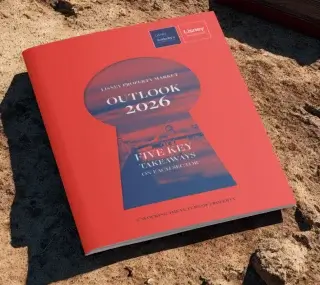 Lisney Property Market Outlook: Irish Property Market Poised for Steady Growth in 2026
Lisney Property Market Outlook: Irish Property Market Poised for Steady Growth in 2026
 Inflation in Romania Slows to 9.6% but Remains Above Forecast
Inflation in Romania Slows to 9.6% but Remains Above Forecast
 Riots in Mexico Disrupt Air Links to Resort Destinations
Riots in Mexico Disrupt Air Links to Resort Destinations
 UK House Prices Stabilise After 2025 Slowdown
UK House Prices Stabilise After 2025 Slowdown
Global Attitudes Towards the Green Economy in 2024
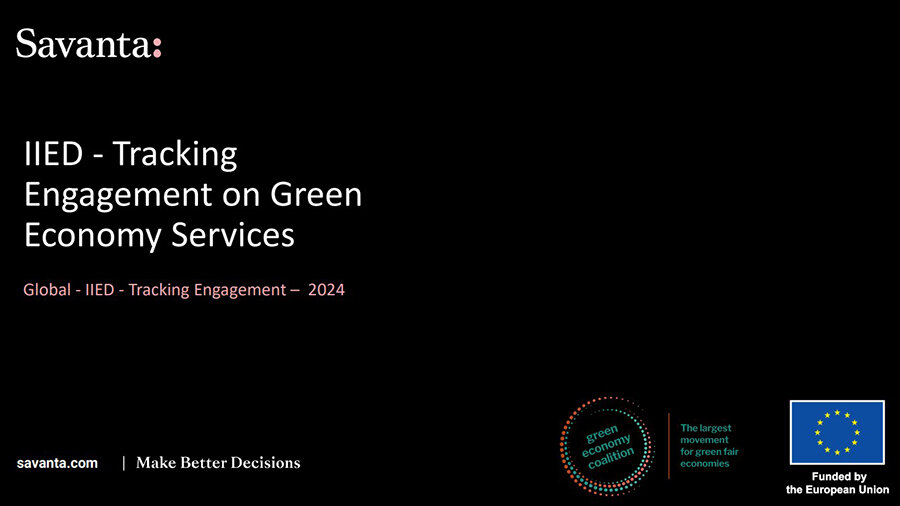
The Green Economy Coalition and Savanta conducted a survey of over 10,000 individuals across ten countries, revealing that 71% of people globally would prefer stronger environmental protection, even at the cost of slower economic growth. Contrary to common perceptions, demand for green measures is significantly higher in less wealthy nations compared to richer ones.
Methodology
The survey included participants from Australia, Brazil, China, India, Indonesia, Mexico, Nigeria, Peru, South Africa, and Turkey. Overwhelming public support for environmental protection was observed in all locations.
The index evaluates countries across four key categories:
Willingness to bear personal costs – Measures respondents' readiness to pay higher taxes, incur expenses for eco-friendly purchases, and prioritize environmental protection over economic growth.
Demand for green actions – Evaluates public support for government and private-sector initiatives in renewable energy, pollution reduction, and decarbonization.
Implementation challenges – Analyzes obstacles such as lack of government support, high costs, and insufficient knowledge that hinder further progress.
Environmental solidarity – Assesses concern for future generations, moral responsibility, and belief in personal accountability.
Each category was rated on a scale from 1 to 5, with detailed metrics within each. While the ratings do not capture every nuance of environmental interaction, they provide a comparative framework for strategy development and identifying opportunities. Lower scores may reflect structural or economic challenges rather than a lack of environmental responsibility.
Generational Choices
Middle-aged respondents (45–64 years) are the most willing to make lifestyle changes for sustainability, with 62% expressing positive attitudes. Younger generations are more likely to pursue green jobs, support renewable energy investments, and favor higher taxes to fund environmental protection. Meanwhile, those aged 65 and older are most supportive of reducing pollution, ensuring affordable clean energy, and addressing generational imbalances.
Interestingly, optimism about the future differs by age. Young adults aged 25–34 are more hopeful, with 51% believing enough is being done to secure a sustainable future for the next generation. In contrast, 37% of individuals aged 55 and older disagree with this sentiment.
A majority of respondents (77%) are "very" or "extremely" concerned about the impact of current environmental policies on future generations. This concern is significantly higher in less developed countries, such as Nigeria (88%), compared to wealthier nations like Australia (50%).
Parental status also influences environmental attitudes. While 80% of parents worry about future generations, compared to 70% of non-parents, 42% of parents are "extremely concerned." Interestingly, parents are more likely than non-parents (49% vs. 41%) to believe enough is being done for a sustainable future.
Country Preferences
Environmental protection demand is highest in emerging economies compared to wealthier Western nations. Turkey (91%), Nigeria (89%), and South Africa (88%) showed the strongest public support for green measures.
Despite widespread support, skepticism about political leaders' ability to deliver a sustainable future varies significantly. China exhibited remarkably high trust levels (83%), while countries like Peru (23%), Australia (27%), and South Africa (28%) displayed pronounced skepticism.
A lack of government support is a key obstacle to more environmentally conscious behavior, emphasizing the need for stricter regulations on industrial pollution, waste management, and clean energy investment. This issue is more pronounced in emerging economies like Nigeria (65%) and Peru (61%) compared to developed countries like Australia (34%).
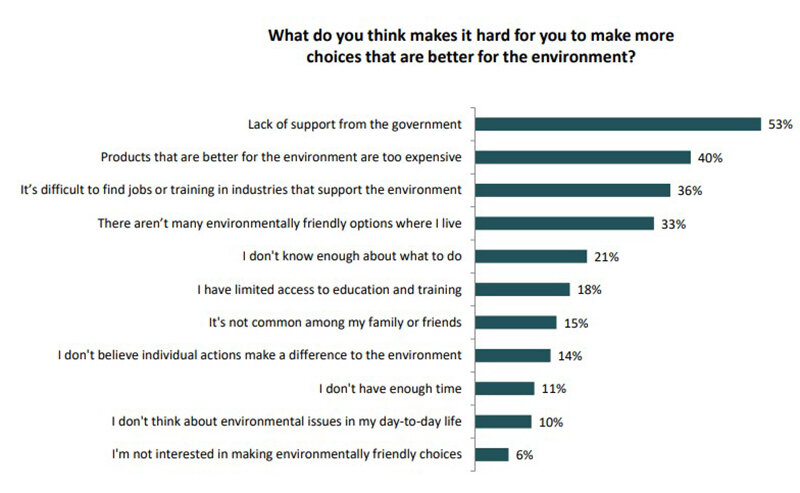
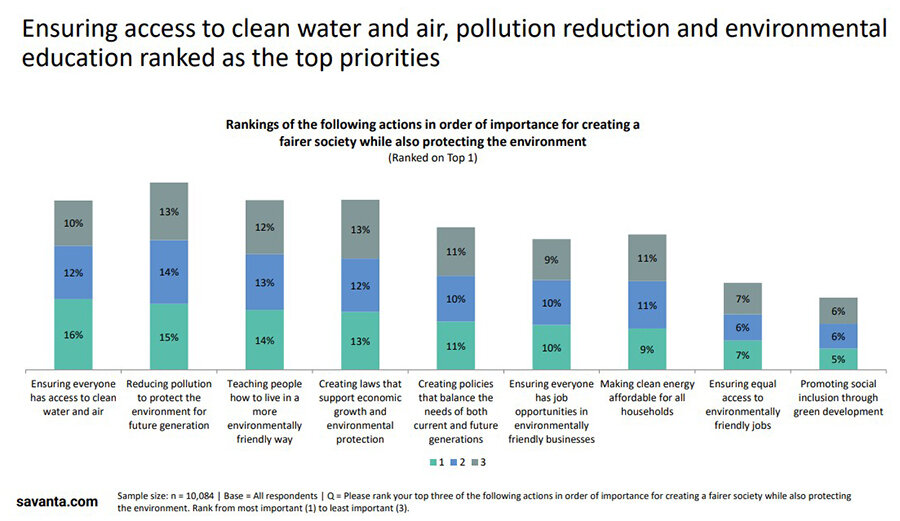
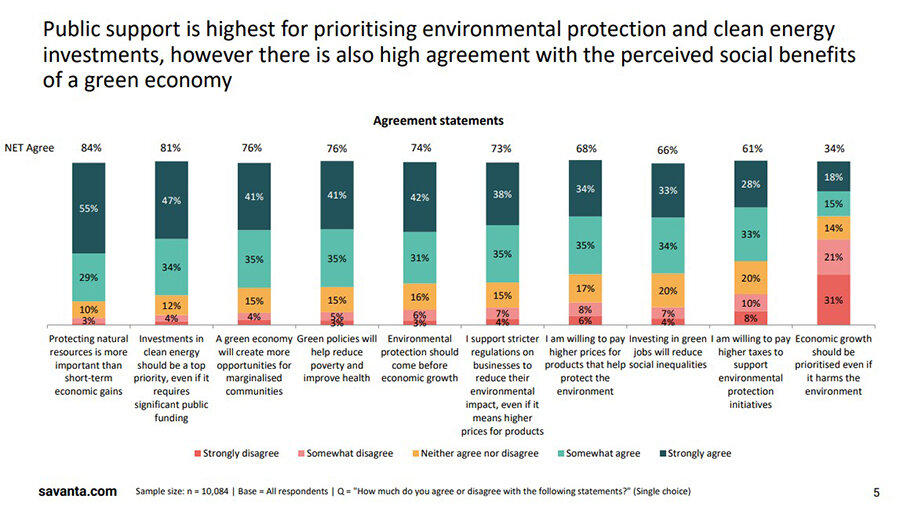
Key Findings
The survey highlights that developing countries outperform wealthier nations in demand for green actions, willingness to bear personal costs, and environmental solidarity. For instance:
India demonstrates high enthusiasm for personal commitments and green initiatives but faces significant barriers to implementation due to structural and economic constraints.
China struggles with implementation challenges but shows a higher willingness to incur personal costs for environmental protection.
Australia, the wealthiest country surveyed, consistently ranks low in environmental solidarity, demand for green actions, and willingness to bear personal costs, despite its natural beauty and resources.
Strategic Implications
The survey suggests that countries with lower scores in specific categories could benefit from targeted support to address their unique challenges. For example:
India could focus on reducing implementation barriers.
China might work on enhancing public readiness to support environmental measures.
There is also potential for cross-national collaboration, where countries excelling in certain areas can serve as models for others. For instance, Nigeria's strong environmental awareness could inspire similar initiatives in lower-ranking nations.
The private sector has opportunities to align sustainable development strategies with public demand. High demand for corporate green actions in countries like Indonesia and Australia indicates a favorable environment for green businesses.


